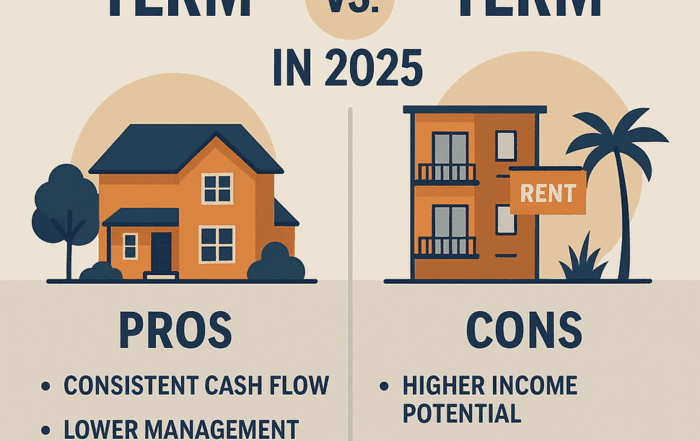
Title: Opportunistic Buyers Are Back: Why Florida’s Real Estate Market Feels Like 2010 Again
Focus Keyphrase: new real estate investment opportunities Florida SEO Title: Opportunistic Buyers Return: New Real Estate Investment Opportunities in Florida Meta Description: Discover why opportunistic buyers are returning to Florida’s real estate market in [...]
Can Buying Real Estate in Florida Help You With Immigration?
Can Buying Real Estate in Florida Help You With Immigration? So you’re wondering, “If I buy a couple rental properties in Florida, does that mean I can stay here forever, sip cafecito on the [...]
Long-Term vs. Short-Term Rentals in 2025: Which Strategy Wins?
In 2025, the real estate world feels a little like a game show. Behind door one: long-term rentals—steady, reliable, and mostly drama-free. Behind door two: short-term rentals—flashier, possibly more rewarding, but full of surprises. [...]
What Does “Return” in Real Estate Really Mean? (And Why It’s More Than Just Rent Checks)
What Does “Return” in Real Estate Really Mean? (And Why It’s More Than Just Rent Checks) Ever hear someone brag about a “20% return” on a real estate deal and think, “Umm… where did [...]
What Does Cap Rate Mean in Real Estate (And Why I Actually Use It)
What Does Cap Rate Mean in Real Estate (And Why I Actually Use It) Alright, I’m gonna break this down real easy—because I wish someone had done that for me when I started. Cap [...]
Real Estate Investment Analysis: How to Know If a Deal Is Actually Worth It
Real Estate Investment Analysis: How to Know If a Deal Is Actually Worth It You know how some people go to Costco and buy stuff just because it’s in bulk—even if they don’t need [...]



